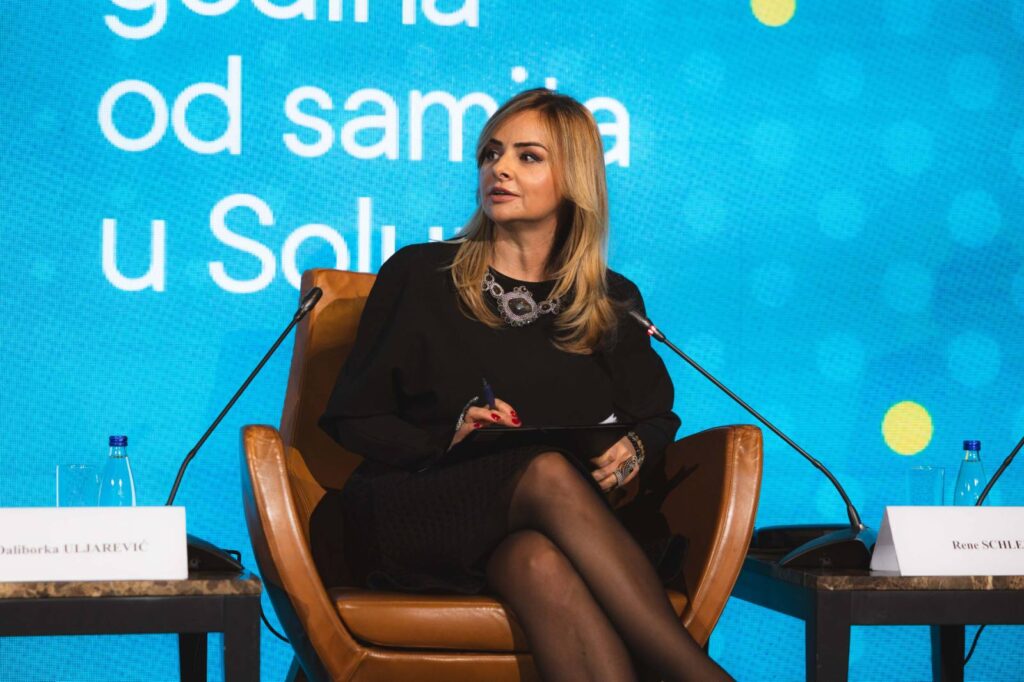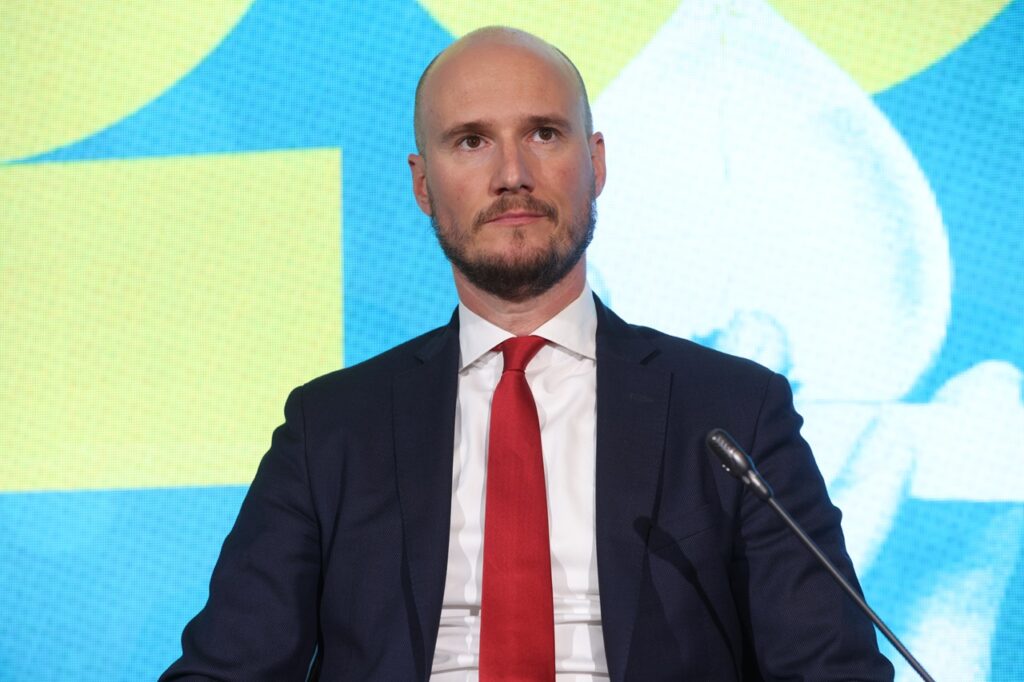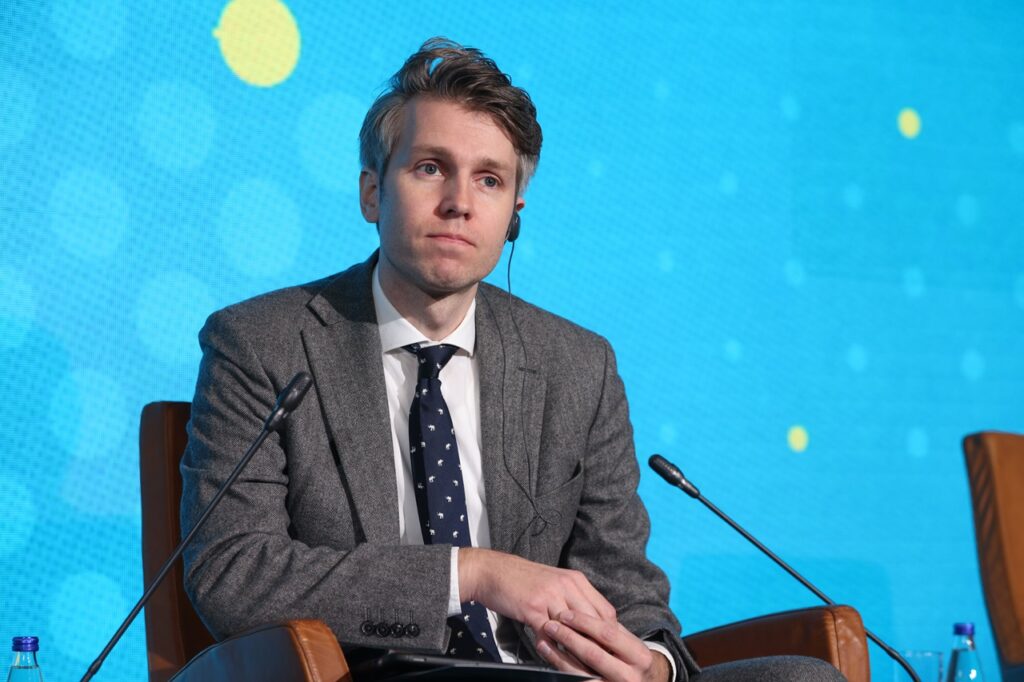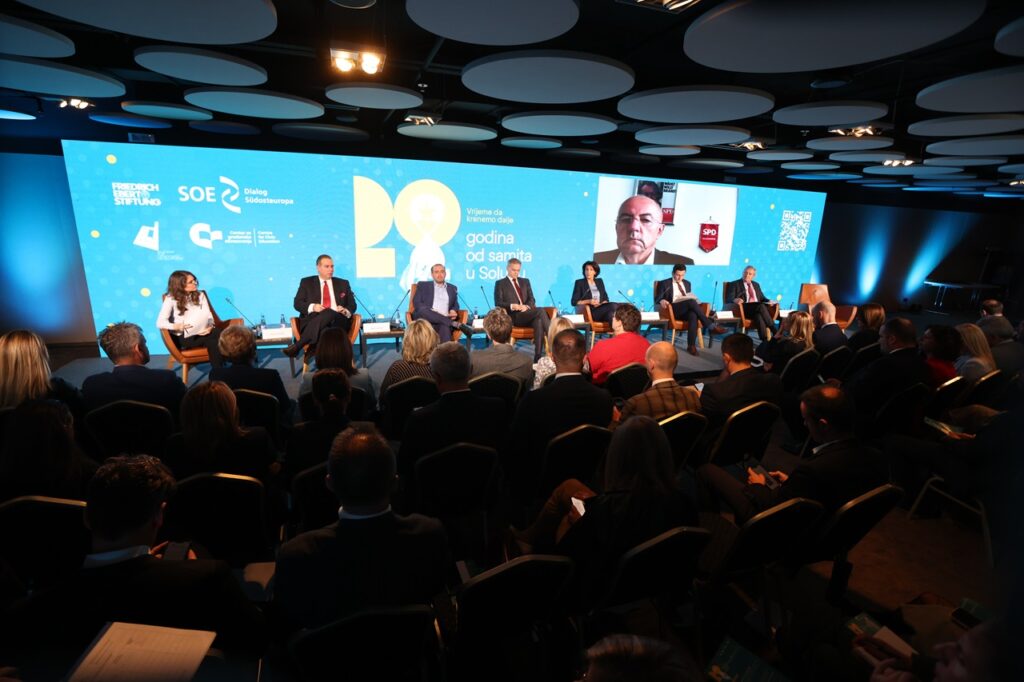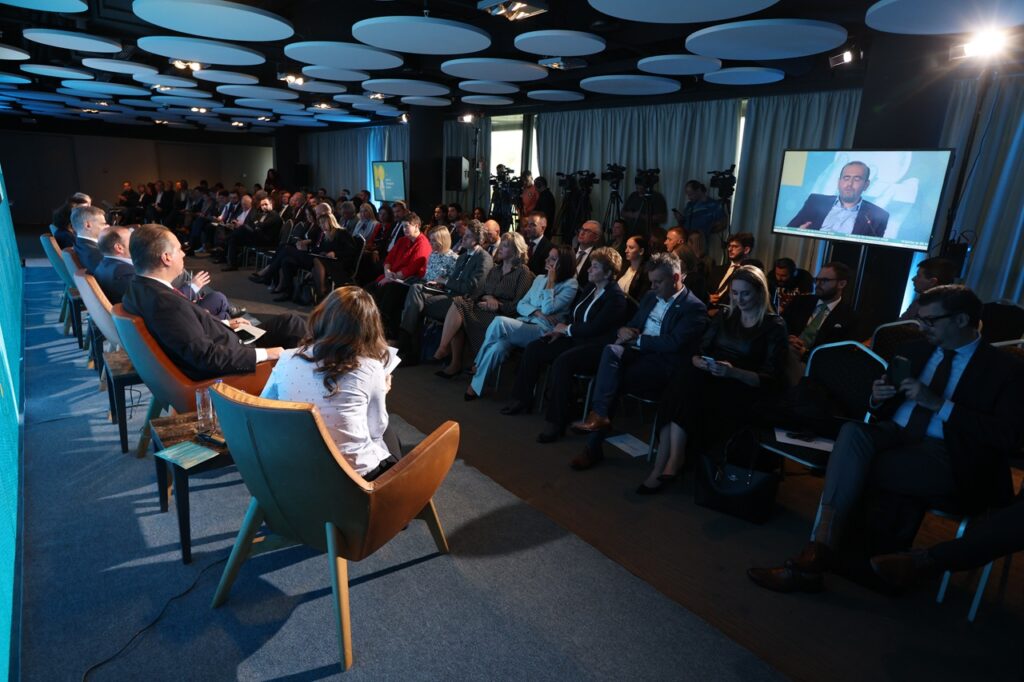The region, including Montenegro, 20 years after the summit in Thessaloniki, deservedly stands in the same waiting room, as there has not been concincing display of political will for reforms, as assessed by the Executive Director of the Centre for Civic Education (CCE) Daliborka Uljarević, at the conference “Time to Move on – 20 years of Thessaloniki Summit”, organized by CCE, the Friedrich Ebert Stiftung (FES) and the Regional Academy for Democratic Development (ADD).
She also said that Montenegro, once a prominent student, “the truth in the group of mediocre ones”, has now become repeater without any signs that it will make the necessary substantial progress in the near future. “I am not even sure what the future perspective of the European integration of Montenegro is, especially given the latest information regarding to the structure of the Government,” added Uljarević.
According to her assessment, this kind of Government, which harbours many reservations towards the European Union (EU), comes at a time when Montenegro has gone six years without closing any chapters. “On the one hand, we have a continuous and dominant majority of citizens dreaming the European dream and supporting Montenegro’s path to EU membership – currently 77.4 %, according to our latest survey. However, at the same time, the EU, its member states, the USA and other Western partners are losing influence in Montenegro and in the region. It is indicative that the authorities are getting closer to those who do not insist on progressive values and the functional rule of law,” said Uljarević.
She stated that it is therefore not a surprise, “even though we should all be concerned”, that enthusiasm and optimism within the negotiation structures in the region, which are the backbone of the process, are at a minimum.
Uljarević said that Montenegro is seeing off the second Government in the last three years which, as she assessed unlike the governments of the previous regime, did not even simulate dedication to the process of European integration, explaining that it will quickly show in which direction the new Government is going, but that the indications so far are not encouraging in what should be a qualitatively different approach.
She pointed out that in the vortex of regional instability, political trades in which agreements are not based on values, but on a mere struggle for survival – the subject of European integration remains on the sidelines.
“20 years after the summit in Thessaloniki, we deservedly stand in the same waiting room, because convincing political will for reforms has not been demonstrated, in addition to what is already chronic undercapacity, lack of knowledge and indolence, and an excess of empty but dangerous ambitions. Today, geopolitical circumstances bring a favorable wind for the region – there is greater attention of the Union, its institutions and officials for the enlargement process. This opportunity must not be missed nor should the process of EU integration be allowed to be a process of disappointed expectations”, said Uljarević, underlining the need for the EU to react more promptly and proactively by providing support in reaching the standards that the region strives for, as well as avoiding those that distance society from progressive values.
She emphasized that political responsibility is the backbone of the process. “This responsibility should include the willingness to replace populism with work and credible results, and then we can talk about a clearer EU perspective for countries aspiring to join the EU and reduce existing frustrations due to the lack of progress,” said Uljarević.
As for how high EU integration is on Montenegro’s agenda, as Uljarević pointed out, it is symbolic that the country has been without a formal chief negotiator with the EU for nearly a year.
The director of the Regional Academy for Democratic Development, Balša Božović, said that 20 years after the Thessaloniki summit, a significant part of the Western Balkans still wants to believe in its future is in the EU. “New warlike conditions in Europe, Russia’s aggression against Ukraine, have made it necessary for the EU and the Western Balkans to renew their mutual commitment and to continue working together, under new circumstances, on the integration of this part of Europe into the Union,” stated Božović.
Božović mentioned that the experience of Ukraine “teaches us the hard way that peace is no longer guaranteed”.
“The Western Balkans, as Europe’s soft underbelly, represents a weak point in European unity in foreign and security policy,” emhasized Božović.
He added that it is therefore essention to address the issue of stalled reform processes and burdersome relationships from an EU perspective based on the Copenhagen criteria and the European system of values.
Božović stressed that the recent years have shown that some partners lack the sensitivity to the situation in the Western Balkans, and, as he believes that the European sensibility is more necessary than ever before. “Peace is no longer taken for granted, peace is a privilege, and in the Western Balkans it is a fragile one,” according to Božović.
He is of the opinion that after the terrorism in Kosovo, “we have an obligation to focus on the democratization and Europeanization of the region”. “We can’t pretend that nothing happened in the Northern Kosovo because, in that case, it will happen again,” said Božović, emphasizing that European institutions must find a way to counter influences that could disrupt peace in the Western Balkans.
Božović believes that it is necessary to help those who have advanced the furthest in the negotiations, such as Montenegro. “Assisting Montenegro in achieving political consolidation after a three-year crisis and enabling it to continue on the EU path would be a sign that the Union is not geostrategically yielding this part of Europe to malign influences from the East and does not tolerate malign influences from countries in the immediate environment,” believes Božović.
He said that if any state does not want a future in the EU, it should be clearly stated, but that this decision should not hinder others and return them to an uncertain past. “It’s time to move on because tomorrow could be too late,” concluded Božović.
The director of FES Regional office for Southeastern Europe, Rene Schlee, assessed that “20 years since Thessaloniki is an anniversary that does not really give us a reason to celebrate”.
He mentioned that the ambitions and ideas presented in Thessaloniki were different from the reality of today. “However, by no means can we say that nothing has happened”, added Schlee.
According to him, some progress has been made – negotiations with some countries are ongoing, and these processes are at the beginning with others, such as Albania and North Macedonia. “However, it is difficult to call it a significant breakthrough because it is a term that inevitably leads to high expectations. Looking back on the previous 20 years, it is hard to say that many expectations have materialized,” pointed out Schlee.
On the other hand, he mentioned that a lot is happening, and there are new ideas and initiatives. “Sometimes conflicting ideas about how to continue the enlargement process. Fridrih-Ebert Stiftung seeks to bring together representatives of the authorities, the non-governmental sector, and the academic community, so that all of these actors can discuss these ideas because their synergy is important,” Schlee said.
Candidate for the Minister of Foreign Affairs of Montenegro, Filip Ivanović, on the panel “Process of European integration in the Western Balkans 20 years after the Summit in Thessaloniki”, stated that Montenegro has never officially heard the word “backsliding” from Brussels. “No report of the European Commission (EC) used that word. We can interpret whether there was a setback or not, but, unlike some other countries in the region, the EC has never mentioned such terms for Montenegro”, said Ivanović.
He pointed out that the dynamics have changed and that this should be a cause for concern, that is, the fact that Montenegro has been progressing faster or slower for years in harmonizing and incorporating the legal acquis, but also stagnating in some respects.
“First we have to make progress on chapters 23 and 24, so we can move on. This is also the goal of the government that will be formed next week, with a clear and precise agenda that includes the acceleration of European integrations,” stated Ivanović. He reminded that appointments to the judiciary are the responsibility of the Parliament, adding that he expects political actors in the Parliament to demonstrate in action what is declaratively stated in their programs – advocating for full membership in the EU. This, as Ivanovic added, will be a test not only for the new parliamentary majority but for the entire Parliament.
“I am convinced that there is enough hearing in the new majority that the election of judicial functions is very necessary so that we can move forward in the process of European integration,” Ivanović said.
He also said that the negotiating structure of Montenegro must be strengthened so that it is robust and agile. “We have to bring back the chief negotiator, to strengthen the Mission of Montenegro to the EU, to fill the neuralgic points in the administration – primarily I mean at the possibility of successfully writing infrastructure projects”, believes Ivanović.
He announced that the activities of the new government in the field of European integration will be based on the strategic communication of Montenegro as the best choice for the EU, and in the sense that enlargement is alive. “If we observe optimistically and in good faith, the moves of the people who will be in the future Government, we will understand that it is time for that. As the most recent example, I would point out yesterday’s decision to postpone the census for a month and to open a social and political dialogue, as well as to respect the recommendation of the European Parliament,” Ivanović said.
He said that by respecting the recommendations of the EP, the possibility of dialogue with the opposition, municipalities and other institutions is opened. “It is an example of how we will act in what is the ultimate goal – the membership of Montenegro in the EU by 2030. I think we can be ready even earlier”, said Ivanovic.
He also said that the Government will be strongly pro-European oriented, and that the PES, as the largest constituent of the government, is the guarantor of that.
Commenting on the Government’s ties with Belgrade, Ivanović said that the program of this and all previous governments included cooperation with Serbia as a neighbor on the basis of mutual respect. He also stated that some parties that will make up the parliamentary majority had good relations with Moscow. “But they are not the only ones, and some parties that are now in the opposition had a good relationship with Moscow, had signed an agreement with United Russia, so that did not prevent them from being pro-Western oriented,” Ivanović said. He stated that Russia’s aggression against Ukraine encouraged all political and social actors to abandon certain illusions regarding relations with Russia.
Answering a direct question from the audience, to what extent the new Government will respect final court verdicts, especially those related to the illegal removal of certain officials, such as the case of Brđanin, he underlined that the Government will be committed to the rule of law and that the fact that some constituents of the current Government are not in he also indicates to the new Government that he will change his approach.
The adviser to the president of North Macedonia for foreign policy and constitutional issues, Aleksandar Spasov, stated that, since the Summit in Thessaloniki in 2003, Bulgaria, Romania and Croatia have become EU members, while the other countries are still not. “And we don’t know when it will happen, there is mention of 2030, the year we are aiming for, but that is a political declaration, rather than a set date that will depend on many factors,” said Spasov.
He pointed out that the EU is in a different geopolitical position today. “It is important for the EU that this potential does not slip away, that we do not remain an island that is isolated from its European neighbors,” said Spasov.
The Vice-President of the Serbian Parliament, Borko Stefanović, underlined the agreement of everyone that it is time to move on towards the EU, but that the question is how to move and where. “Now we have an open formal invitation for all of us from Brussels. There is also a formal open desire of all of us to join. In the meantime, we are wasting energy and time trying to understand where we actually are,” said Stefanović.
He said that 44 percent of Serbian citizens support joining the EU, adding that, in the current circumstances, he was surprised by so much support. “We have an open autocracy, a facade of democracy, a lack of media freedom, corruption and ties to organized crime. That’s why an approach based on merit is important, we have to do our homework, but the EU has to do it too,” said Stefanović.
As he pointed out, the states of the region must unblock each other because reconciliation is of crucial importance. “We need to create some joint secretariats to erase some of the fears that exist between us. We have to speak with a single voice. If we don’t stand together, we have little chance and we will end up condemning our governments and their moves”, concluded Stefanović.
Director of the Directorate for European Integration of Bosnia and Herzegovina (BiH), Elvira Habota, said that the country implemented many important laws in priority areas several years ago, when they did not even have the status of a candidate for EU membership.
She is of the opinion that the more progress BiH makes, the better the EC report will be, which will be published on November 8. “That document is very important because it is the first report since obtaining candidate status and other EU decisions will be made based on it,” she explained.
“Whenever we have a strong political will in BiH, progress is inevitable and fast, and everything gets better. On the other hand, sometimes minor technical and expert issues become the subject of political manipulations and this costs us a lot because it slows down the entire process”, said Habota.
She said that, regardless of all that, she is glad that the percentage of citizens who want BiH to be in the EU remains high, around 73 percent, and that membership in the EU is never questioned.
Acting Director of the Directorate for Europe and the EU in the Ministry of Foreign Affairs and Diaspora of Kosovo, Fitor Murati, stated that it is important to keep the perspective towards EU membership, as this encourages both necessary and expensive reforms. “For Kosovo, there is no plan “B” or “C”. We want to be part of the Euro-Atlantic community because we believe in its values,” Murati pointed out.
He said that there is also a geopolitical context in the process of integration. “The arguments we used are justified, we will see in the coming months whether we will have catastrophic consequences of Russia’s aggression against Ukraine. “Unfortunately, the act of aggression by Serbia, which supported the paramilitary actions that attacked us, is unprecedented,” Murati said.
As he said, Kosovo was sending messages that pockets of influence for Russia should be closed. “This is possible only by accelerating the process of integration towards the EU for the entire region. In order to do this in one country, the entire region must progress”, said Murati.
The General Secretary of the Ministry of Europe and Foreign Affairs of Albania, Gazmend Turdiu, said that EC reports should be interpreted seriously because they are an indication of real progress.
According to him, the Summit in Thessaloniki was a very important moment in the history of the region, but European integration began much earlier. “We are used to the word “expansion”, but we are returning home. We are returning to where we belong – we are talking about reunification, reunification with Europe,” said Turdiu.
He warned that society does not accept a vacuum and that “if space is open” something or someone will fill it. “We don’t want alternatives, but they exist – Russia, China, the Middle East. The longer the EU keeps its distance from this region, the situation will get worse,” said Turdiu.
Member of the German Bundestag, Josip Juratović, stated that, in the context of EU enlargement, there is a geopolitical and security sense, but that the EU has also become politically relatively unstable.
“Right-wing structures are emerging. The question of democratic values is becoming more and more important, and this opens up the question of who will join us, that is, what structures are these. It’s clear to everyone that we need the Western Balkans for security reasons, but we also don’t care who approaches us,” said Juratović.
He said that the economy and economic issues alone will not solve the challenges facing Europe.
“The Western Balkans must move towards Europe with more solidarity. It should create a common strategy on the way to the EU. It does not matter which country it is, if we really want to join the EU, then we need a common political platform,” concluded Juratović.
MINA

